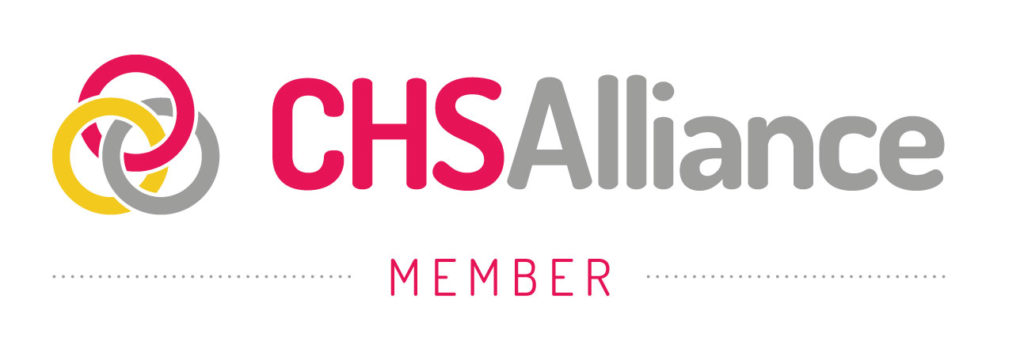Although no longer in the international spotlight, the humanitarian crisis in Palestine continues unabated. In Gaza, food insecurity impacts 7 out of 10 people due to widespread poverty and high unemployment. As the strangulating blockade approaches its twelfth year, the overall health and well-being of the civilian population continue on a downward spiral. Meanwhile, the…
As 2018 comes to an end, we are sad to report that living conditions in Gaza continue to get worse, taking an unfathomable toll on the population. Unemployment is over 55%, with youth unemployment at 75%, while most who do get paid receive only half their wages. Many families live on $1 a day, at best.…
With every passing month, Gaza becomes more “unlivable”. More than 1.6 Million of the Gaza Strip’s 2 million residents now rely on the delivery of humanitarian goods and services just to survive. According to the World Bank “Gaza’s economy is in a free fall” with an unemployment rate reaching more than 32 percent, “the highest…
Living in Gaza is a challenge for anyone, but today it is especially so with the with electricity running at a mere 4 hours a day, limited availability of clean water, and a blockade that persists, entering its 11th year. Our annual Ramadan Farmers project distributes fresh food to the most marginalized areas, mostly where…
Did you know that 47% of households in Gaza don’t know where their next meal will come from? (OCHA, 2016) Since March 30, over 40 Palestinian protesters, including 5 children, have been killed and over a thousand injured, among them hundreds of children who were attacked with live ammunition. Participation in a demonstration does not constitute…
The fallout from the 2014 war in Gaza continues to have a devastating effect on the lives of the Palestinian people. Families are spending over half their income on just the necessities to live, and those are the ones who have income. One in 2 people are considered food insecure . With over 50% of…
Although no longer in the international spotlight, the humanitarian crisis in Palestine continues unabated. In Gaza, food insecurity impacts 7 out of 10 people due to widespread poverty and high unemployment. As the strangulating blockade approaches its twelfth year, the overall health and well-being of the civilian population continue on a downward spiral.
Meanwhile, the twin blows of funding cuts to the UNRWA and the discontinuation of USAID assistance for Palestine have led to even more misery among large swaths of the population dependent on outside aid for survival. Fuel shortages have contributed to the suffering, crippling the health system, while rolling blackouts play havoc on every aspect of life. According to reports, 97% of Gaza’s water aquifers are contaminated, providing water unsuitable for drinking. The end result of this completely avoidable, man-made crisis is that gastrointestinal diseases account for 12% of all deaths in children under 4 years of age.
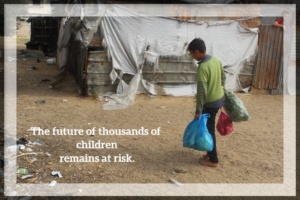
Indeed, no aspect of Palestinian life has been unaffected by this crisis. Two million people in Gaza survive on the brink of catastrophe, and the future of thousands of children remains at risk.
While families scramble to survive, KinderUSA continues to deliver food to indigent families and provide meals for school children in Gaza. We believe that our work today is more essential than ever as Palestinians are assailed from all sides in what can only be viewed as a sustained effort to crush the indomitable spirit of resilience and uproot Palestinians from their intimate connection to their land.
Over the years, you have generously supported KinderUSA in our work on behalf of needy children in Palestine and helped promote innovative projects that promote independence and sustainability. When others have shied away, you have stepped forward, upholding the belief that all children – including the children of Palestine – deserve the opportunity to live and thrive in a safe environment that offers hope for a better future.
Please consider making an online tax-deductible contribution of $25, $50, $100, or whatever is meaningful to you. Many employers match employee gifts to KinderUSA which is a way to double or in some instances triple your donation. Together, InshaAllah, we can continue to deliver hope.

As 2018 comes to an end, we are sad to report that living conditions in Gaza continue to get worse, taking an unfathomable toll on the population. Unemployment is over 55%, with youth unemployment at 75%, while most who do get paid receive only half their wages. Many families live on $1 a day, at best. Over 95% of the water supply is now undrinkable due to the persistent lack of electricity limited to about 4 hours per day. The land, sea, and air blockade is now in its 12th year, sealing Gaza off from the rest of the world.
Children in Gaza are caged in a toxic slum from birth to death, where they are being suffocated out of hope, out of life, out of any sense for progress.
One year from now, Gaza will be “unlivable” as determined by the United Nations. Officials recently reconsidered their prediction about 2020 by saying “We’ve been optimistic about this deadline. Gaza is already, in fact, unlivable.”
Despite the hardships, we at KinderUSA are inspired and motivated by the determination and perseverance of our partners and beneficiaries in Gaza. We continue to promote the empowerment of women heads of household by focusing on self-sustainability. KinderUSA provides them with the education and tools they need to begin chicken farming and then we are their first customer, purchasing the eggs and chickens to use for our emergency food distribution program serving Gaza’s neediest families. With your support, we hope to extend this project into 2019 and beyond.
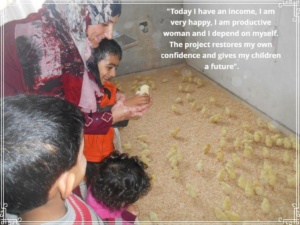
Your donation will continue to enable women to begin their own business, generating an income to care for their children: $170 will buy 200 chickens to get them started; $45 will buy a water tank to feed the chickens; and $25 will buy enough chicken feed to last a 4-month period. To date, KinderUSA has provided 74 women with the necessary skills and tools needed to operate their own business.
Um Mohammed from South of Gaza told our field representative, “Before the project I was very sad because I am the breadwinner of my family ( 8 members ) and my husband left me 3 years ago. I am alone and my house lacks of everything. Today I have an income, I am very happy, I am productive woman and I depend on myself. The project restores my own confidence and gives my children a future”.
Please consider a year-end donation to ensure that this project continues. We at KinderUSA send you the warmest wishes for a new year of peace, hope, and security.

With every passing month, Gaza becomes more “unlivable”. More than 1.6 Million of the Gaza Strip’s 2 million residents now rely on the delivery of humanitarian goods and services just to survive. According to the World Bank “Gaza’s economy is in a free fall” with an unemployment rate reaching more than 32 percent, “the highest rate in two decades”. While the 11 year blockade on Gaza is the primary factor, the recent funding cuts to the UNRWA by the current administration has only deepened the sense of despair among ordinary Palestinians.
After Ramadan, KinderUSA sat with beneficiaries to map out upcoming projects. All spoke clearly and resolutely about the greatest priority: they need food. “We must wait one year to feed our children full meals in Ramadan. To give them something beyond Ramadan is all we ask,” said Um Omar from Khan Younis.
Yes, you read that correctly. Many families in Gaza rely on the Ramadan project to provide their children healthy food. When the funds run dry…when the blessed month of Ramadan passes…these families must scramble to put food on the table.
Working with our partners on the ground, KinderUSA is in the distribution phase of a 4-month project that will provide fresh food to 725 families in Gaza, enlisting farmers and our women cooperatives. Live chickens and fresh eggs will be purchased from our successful, female-run chicken micro-enterprise project with each family receiving 2 distributions over this 4-month period.
Reports from the field are heartbreaking. Ibrahim, one of our beneficiaries, states that, “I am a sick person. I have not been able to work for a long time. I did not receive any help during the holy month of Ramadan except KINDER assistance (Food Distribution). As you see, my house is very bad, I do not have a kitchen, and there is no door to the bathroom. Also, we suffer from the rain water during winter, with the entry of insects and some reptiles into the rooms…my children cannot sleep all nights because of bugs…they often have skin diseases.”
For many Palestinian families, our modest food distributions provide a ray of hope amidst the bleak uncertainty of life in Gaza. “I was afraid of not being able to meet my children’s requirements because of the very difficult economic situation, and my inability to work,” said Ibrahim. “This project (funded by Kinder) helps me to provide the needs of the house as it contains chicken, eggs, vegetables, cheese and others. Thank you to all.”
Over the years, our efforts together have made a difference in the lives of thousands of Palestinian children and their loved ones. Please consider making an online donation today and put smiles on the faces of these wonderful, resilient children.
Living in Gaza is a challenge for anyone, but today it is especially so with the with electricity running at a mere 4 hours a day, limited availability of clean water, and a blockade that persists, entering its 11th year. Our annual Ramadan Farmers project distributes fresh food to the most marginalized areas, mostly where families live in makeshift shelters and rubble from the successive wars. With more than 4,000 people per square kilometer, it remains the most densely populated place in the world.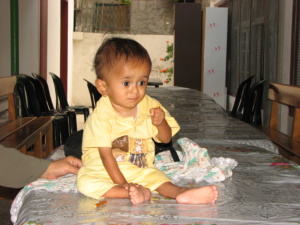
Every year, the goal of the project is to support and ensure the food security of vulnerable households in the Gaza Strip with this year targeting 13 different areas in 4 separate governorates. Year after year, our project increases as more and more families are hungry and in need of nutritious food. This past year, our partner Beit Lahia, served over 26,000 beneficiaries, employed over 95 farmers and over 70 women cooperatives whose families also benefited adding another 1320 beneficiaries. Each family received fresh food inclusive of live chickens, fresh dairy, vegetables, jam, maftoul, and pressed dates to name a few items, twice a month throughout the month of Ramadan.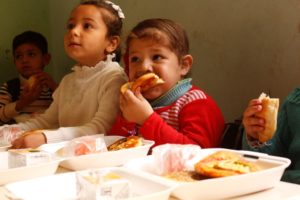
At the close of the project, more funds were available and we continued to serve another 825 families in desperate need for two more months, providing fresh food once in each month. Our office staff in Gaza hear and see firsthand heart wrenching stories about our beneficiaries who are living on the brink. Thank you to all who contributed to this most important KinderUSA project and have not forgotten about the children and their families in Gaza. We could not have served this many people without your generosity!
Our goal for Ramadan 2018 is to feed a minimum of 2500 families of 6-8 and more, an estimated 20,000 people in need. Please help us reach as many families this season as possible. Our work is only possible with your support. May you experience the blessings of Ramadan that come with giving generously to those in need.

Did you know that 47% of households in Gaza don’t know where their next meal will come from?
(OCHA, 2016)
Since March 30, over 40 Palestinian protesters, including 5 children, have been killed and over a thousand injured, among them hundreds of children who were attacked with live ammunition. Participation in a demonstration does not constitute an act of hostility or direct endangerment of life, and certainly is not a justification to use live fire. What is happening is an abhorrent violation of humanitarian law and those responsible should be held responsible. It’s heartbreaking to think that during a time of reflection, peacefulness, and devotion to faith, our children in Palestine could suffer without food through the hot days and long Ramadan nights, while we’re eating our fill.
80% of Palestinians in Gaza rely on humanitarian aid for food, while budgets are being slashed for the global programs they rely on! (Oxfam, 2016)
The protests reflect growing frustration and despair as Gaza becomes unlivable. The situation will further erode as a result of massive cuts to UNRWA imposed by the current US administration. The infrastructure and delivery of services such as sewage treatment are threadbare.
Health services in Gaza are on the brink of collapse while blackouts lasting 18-20 hours have forced the closure of some health facilities. Over one million children are vulnerable to waterborne diseases with 96% of potable water “unfit for human consumption” according to the World Health Organization. More than half of these children are suffering from post-traumatic stress, including fears, anxiety, and nightmares. One of the mothers of our beneficiaries reports that her 8-year-old child, Amer, “screams while sleeping.”
Our upcoming Ramadan Farmers’ project will provide badly needed work and nourishment for over 2500 families. Many of our farmers who live near the border “fence” have risked their lives in preparation for the distribution next week, with some being injured by live ammunition.
 Not only do our farmers and women’s’ cooperatives prepare for the families who will benefit from the distribution, they are also thinking about their own children who are equally suffering.
Not only do our farmers and women’s’ cooperatives prepare for the families who will benefit from the distribution, they are also thinking about their own children who are equally suffering.
Children are every society’s most precious natural resource. Palestinian families are no different. The cruelty in Gaza is hard to witness from a distance. What must it be like on the ground?
Please help us reach as many families this Ramadan as possible. Our work is only possible with your support. May you experience the blessings of Ramadan that come with giving generously to those in need.

The fallout from the 2014 war in Gaza continues to have a devastating effect on the lives of the Palestinian people. Families are spending over half their income on just the necessities to live, and those are the ones who have income. One in 2 people are considered food insecure . With over 50% of the population food insecure, and 80% receiving aid, hunger remains a daily challenge for parents who do their best to provide just one meal a day for their children.
The idea that for every 1000 babies born in Gaza, 28 die from malnutrition is simply unconscionable .
For 5 year-old Yamen, life continues to inflict obstacles. His parents, unable to provide for him, left him in the care of his ailing grandmother who lives in a tin home with sand as a floor. On numerous occasions, Yamen has rebelled both in school and at home, longing to be with his parents. Sadly, he is often found sitting in the middle of the road, tearfully despondent.
Due to his severe financial status, he has been admitted into Kindergarten with the nominal yearly fee of $10 waived so he can enjoy some structure and stability in his life. Teachers have worked closely with Yamen, though as they note, “he is but one of many we see in our classes.” Some of the symptoms of malnutrition displayed by Yamen include listlessness and aching bones. But since he started kindergarten in January where he receives hot meals provided by KinderUSA, he complains less and is more involved and motivated.
“There are some things that we cannot change,” said KinderUSA Board Chair, Dr. Laila Al-Marayati, “but we can make a difference in the daily lives of children like Yamen so they are given a chance to thrive. His case shows how vital this program is to the basic survival of the most vulnerable in Gaza.”
For Yamen and children like him, food aid amounts to their lifeline. The nutritional meals program is not possible without your continued support. We can never underestimate the role we play in the lives of these children.

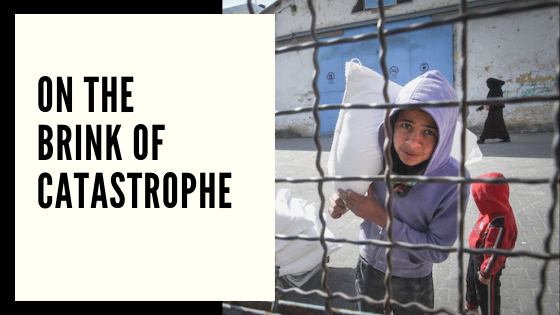

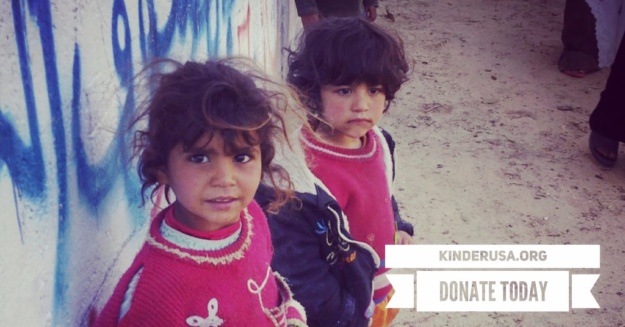







 Not only do our farmers and women’s’ cooperatives prepare for the families who will benefit from the distribution, they are also thinking about their own children who are equally suffering.
Not only do our farmers and women’s’ cooperatives prepare for the families who will benefit from the distribution, they are also thinking about their own children who are equally suffering.

